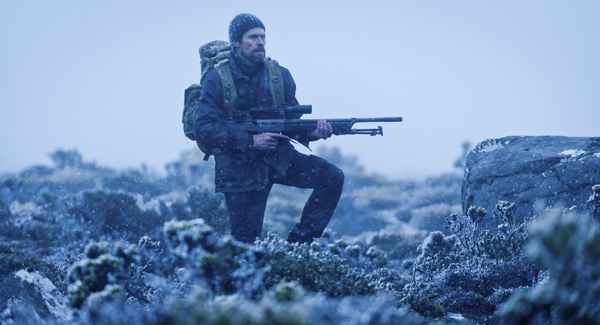
Willem Dafoe (Matt Nettheim/Magnolia Pictures)
The Hunter is set in motion by a cold corporate conspiracy and a steely mercenary, both familiar from many mindless action movies, but where the title character travels is a visually and emotionally striking journey.
The hired gun is Martin (Willem Dafoe) and his target is not a man but what could be the last surviving Tasmanian tiger, a striped marsupial whose rumored sighting has set off a competitive search by naturalists and profiteers. (Big Pharma is as good a representation of evil as any other entity.) His brusque reticence contrasts with the smarmy assistance of Jack Mindy (Sam Neill), who was hired to make the arrangements for the hunter’s stay far up in the mountainous wilds of the Australian island of Tasmania. They travel through lines tensely drawn between environmentalists and unemployed loggers restive over a new round of government restrictions.
Jack finds the hunter lodging in an isolated, ramshackle house that’s practically in suspended animation. It seems to be run by two almost feral children, loquacious pre-teen Sass (Morgana Davies, similarly lively in The Tree) and her younger, silent brother Bike (Finn Woodlock), whose adopted names are part of their very active imaginations. They have a reality to avoid—their father has been missing from the national parklands for months, and their over-medicated, depressed mother Lucy (Frances O’Connor) can’t bring herself to tell them he’s presumed dead, let alone take care of them. If Martin could find a base anywhere else that would take his money and where he could relax with his favorite opera music and a hot shower, he’d move out, even though he reluctantly sees that this family needs his help. Let alone that the girl thinks he can find her father, who the boy believes found the tiger.
Debut director Daniel Nettheim says he has fond memories of family trips through the Australian bush and in Tasmania, and one can see why. The spectacular scenery was filmed to soaring effect by cinematographer Robert Humphreys in a varied topography over a seeming year’s worth of weather changes. But the hunter is all efficient business in the wilderness. Based on the novel by Julia Leigh, writer/director of one of last year’s very feminist takes on Sleeping Beauty, the film follows her detailed look at a very male domain. Martin methodically sets several kinds of serious traps, follows prints, climbs rocks, skins bait, builds fires, grills animals, and endures the elements with the patient fortitude needed to be a good hunter, including his justifiable paranoia that he’s also the prey of an expanded, not completely explained, conspiracy. The natural sunrise/sunset light and sound design helps the audience share his heightened sensitivity to every change around him and to feel every physical challenge as he becomes the prey. Dafoe is so sinewy credible as an outdoorsman seeking a possibly extinct animal that it is a bit ironic he is currently starring as an urbanite facing the extinction of the human race in Abel Ferrara’s 4:44 Last Days on Earth.
Back at his base, Martin initially fixes it up just to accommodate his own needs, but the virtually orphaned kids latch on to him, and he stirs their mother to shake off her grief-stricken torpor. The needle hitting an LP to play Bruce Springsteen’s “I’m On Fire,” the missing husband’s favorite song, would seem sensually cheesy if it weren’t suddenly blasting out of speakers strung around the woods to awaken the mother from being a sleeping beauty (and stirring Jack’s jealousy). With an unpredictable conclusion, the hunter surprises himself that he even cares about rescuing the damaged family—as well as his soul and possibly the tiger—for what could be a sad metaphor for an endangered planet that is as tragic as it is ultimately hopeful.
















Leave A Comment